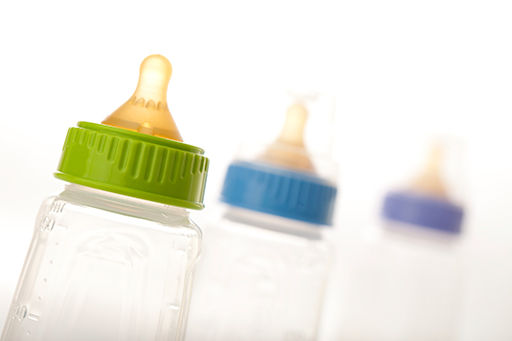OTC

Infant nutrition: Giving parents a helping hand
In OTC
Bookmark
Record learning outcomes
The role of accessible and informed healthcare professionals like community pharmacists is increasingly important in baby and child health and nutrition.

Learning objectives
After reading this feature you should be able to:
- Explain the latest position statement issued by the Royal College of Midwives
- Support all new mothers no matter how they choose to feed their baby
- Recognise common childhood ailments and advise on the treatment options available.
Infant feeding is a highly emotive and very personal topic. Any decision parents make on feeding their baby has to be right for them. What they need is reliable and relevant evidencebased information about both breastfeeding and bottle-feeding to enable them to make an informed choice, as well as access to ongoing support after the birth. In June, the Royal College of Midwives (RCM) published a new position statement, telling midwives that all new mothers should be supported, no matter how they choose to feed their baby – and that the choice parents make should always be respected.
“Evidence clearly shows that breastfeeding in line with World Health Organization (WHO) guidance brings optimum benefits for the health of both mother and baby,” says RCM chief executive Gill Walton. “However, the reality is that often some women for a variety of reasons struggle to start or sustain breastfeeding. If, after being given appropriate information, advice and support on breastfeeding, a woman chooses not to do so, or to give formula [milk] as well as breastfeeding, her choice must be respected.
“We recognise some women cannot or do not wish to breastfeed and rely on formula milk. They must be given all the advice and support they need on safe preparation of bottles and responsive feeding to develop a close bond with their baby.”
Feeding support
Both WHO and the Government recommend exclusive breastfeeding for all babies until they reach six months, and continuing with breastfeeding alongside complementary foods for up to two years. Although ‘Breast is best’ has been the key message in extensive baby feeding campaigns, many women struggle with breastfeeding. Unicef statistics show that UK breastfeeding rates are among the lowest in the world.
According to the National Childbirth Trust (NCT): “Very often, right across society, mothers don’t feel prepared or supported to feed their babies the way they want to. They face judgement or feel guilty about their feeding experiences and the decisions they make. This can affect any mother, however she feeds her baby, and has a very real impact on emotional wellbeing at a challenging and vulnerable time.”
Mothers who use formula milk often say they feel judged because their baby isn’t receiving the benefits that breast milk supplies. Research at Liverpool University in 2016 found that 67 per cent of bottle-feeding mothers felt guilty, 68 per cent felt stigmatised and 76 per cent felt the need to defend their feeding choice. Yet even those mothers who decide to breastfeed say they feel judged about where, when and for how long they breastfeed, especially if they supplement breastfeeding with formula milk.
Many topics, such as feeding cues, responsive feeding and an assortment of feeding difficulties, are relevant to all parents, says the NCT, regardless of how they intend to feed their baby.
Offering advice in the pharmacy
 If new parents visit their community pharmacy, it is often because there is an issue. However, pharmacy teams should use open questions and not make assumptions, says Val Wilcox, NCT’s practice manager and antenatal teacher. “Ask: ‘How are you feeding your baby?’ rather than ‘Are you breastfeeding?’ or ‘Are you bottle-feeding?’. If mothers aren’t breastfeeding, they may interpret a guided question as a judgement.”
If new parents visit their community pharmacy, it is often because there is an issue. However, pharmacy teams should use open questions and not make assumptions, says Val Wilcox, NCT’s practice manager and antenatal teacher. “Ask: ‘How are you feeding your baby?’ rather than ‘Are you breastfeeding?’ or ‘Are you bottle-feeding?’. If mothers aren’t breastfeeding, they may interpret a guided question as a judgement.”
Knowing what is and is not normal for newborns, such as regular feeds and lack of sleep, is important when offering advice. “Pharmacies are often the first port of call for stressed new parents,” says Clare Livingstone, professional policy adviser at the Royal College of Midwives, “so pharmacists should listen to their needs. They shouldn’t reach for the formula milk as a first response if there is a breastfeeding problem, as breastfeeding isn’t always easy to begin with.”
Pharmacies should be able to supply useful products, such as nipple shields and breast pads, and mothers could be signposted to a breastfeeding café, peer support group or their midwives. Some women decide to formula feed due to health pressures, convenience, specialised needs, the need to return to work quickly for financial reasons and for many other reasons. It is important they are given balanced information in a nonjudgemental way, she says.
Key facts
- The Royal College of Midwives says all new mothers should be supported with their feeding choices, no matter how they decide to feed their baby
- Many women give up early on breastfeeding as they don’t get enough support or are too embarrassed to feed in public
- Parental reassurance and nutritional advice should be the cornerstone of management for most functional GI disorders with the exception of constipation.
Breastfeeding support
It is important that women who choose to breastfeed feel supported not only by midwives, but also by their family and friends, says Gill Walton. “Women should not feel guilty or embarrassed about breastfeeding in public and as a society we must continue to develop a culture of positive support for women who wish to breastfeed. Educating the public is key to this.”
Breastfeeding products company Lansinoh recently launched a campaign called ‘Feed with confidence’, which included an award scheme for shops and cafés supporting breastfeeding mothers. No pharmacies were nominated. “Pharmacy staff can support mums by providing practical help in the form of a dedicated chair for feeding,” says Sasha Singh, UK healthcare professional manager at Lansinoh.
“Breast milk is more easily digested than formula, which means babies are fed little and often. This could be every one to three hours, especially in the first few weeks. For many women, knowing they can feed their baby when they are out and about, because they are welcome and encouraged to do so, makes a huge difference.”
Val Wilcox says breastfeeding mothers often worry whether their baby is getting enough milk. “It is more reassuring with a bottle as they can see how much the baby is taking,” she says. “If the baby is coming off the breast floppy and relaxed, then he/she has had enough milk.”
Colostrum (a mother’s first milk) is only available in tiny amounts, and the newborn stomach is only about the size of a table tennis ball, says Clare Livingstone. “Babies only need a few drops of highly nutritious colostrum,” she says. “Pharmacists should reassure parents that it is quality rather than quantity that counts. Bleeding nipples aren’t normal, and not latching on properly can lead to mastitis and sore and cracked nipples. This can often be avoided with timely advice from the right healthcare professionals.”
Bottle-feeding guides
 According to the NCT, parents who bottle-feed can feel that they are not given enough impartial information about formula milks. The recent position statement from the RCM recommended that balanced and relevant information is given to parents choosing to formula feed their babies, whether exclusively or partially, to enable them to do so safely and with support to encourage good bonding. This includes instructions on cleaning and sterilising equipment and the correct method for making up formula feeds.
According to the NCT, parents who bottle-feed can feel that they are not given enough impartial information about formula milks. The recent position statement from the RCM recommended that balanced and relevant information is given to parents choosing to formula feed their babies, whether exclusively or partially, to enable them to do so safely and with support to encourage good bonding. This includes instructions on cleaning and sterilising equipment and the correct method for making up formula feeds.
“Pharmacy teams should know the differences between the different types of milks, as this can be bewildering for new parents,” says Val Wilcox, while Clare Livingstone says that while leaflets on bottle feeding are essential, so are one-to-one discussions. “Pharmacists must make sure customers understand about good hygiene, washing, sterilising and making up feeds,” she says. “Make sure they understand what is needed in terms of sterilisation and equipment, and signpost to other healthcare professionals if customers need extra help.”
New Infant Feeding Guide out now
The 2018/19 Pharmacy Guide to Infant Feeding from Training Matters is out this month. The complete guide to nutrition from birth to over 12 months is distributed with the current editions of Pharmacy Magazine and TM, and is also available online.
Feeding problems
 Many babies bring up small amounts of milk after feeds or if they burp, and this usually causes them no distress. However, parents often worry this means their baby is unwell or has a feeding problem. Crying, vomiting milk after feeds and back arching or being unsettled are not typically symptoms of reflux in most babies. If a baby brings up milk after feeds, it may be that they need smaller feeds more often, or require more frequent winding during a feed. “There is a lot of self-diagnosis and ‘Googling’ of symptoms,” says Val Wilcox. “If a baby is bringing up small amounts of milk regularly, but is generally settled most of the time, posseting isn’t a problem. If they are showing signs of distress after a feed with bouts of inconsolable crying, then parents should see their midwife, health visitor or GP before using any products or changing the formula milk.”
Many babies bring up small amounts of milk after feeds or if they burp, and this usually causes them no distress. However, parents often worry this means their baby is unwell or has a feeding problem. Crying, vomiting milk after feeds and back arching or being unsettled are not typically symptoms of reflux in most babies. If a baby brings up milk after feeds, it may be that they need smaller feeds more often, or require more frequent winding during a feed. “There is a lot of self-diagnosis and ‘Googling’ of symptoms,” says Val Wilcox. “If a baby is bringing up small amounts of milk regularly, but is generally settled most of the time, posseting isn’t a problem. If they are showing signs of distress after a feed with bouts of inconsolable crying, then parents should see their midwife, health visitor or GP before using any products or changing the formula milk.”
It is important babies are properly diagnosed with digestive problems such as lactose intolerance or reflux. Around half of all babies will suffer from a functional gastrointestinal disorder in their first six months, usually because their gut isn’t fully developed. Parents often seek reassurance and advice about medicines as their baby seems to be in distress, and many babies are treated with prescribed or over-the-counter products. However, a new review of international guidelines in Acta Paediatrica confirms that management should focus on parental reassurance and nutritional advice, as medication is rarely required (except for functional constipation).
“Functional GI disorders, like colic, can be distressing for both babies and parents, who often come to us for advice on how to manage it,” says Bhupinder Malhi, a community pharmacist in Sandwell, West Midlands. “We should be the go-to place for parents for the right advice and support, and we should equip our pharmacy teams with the right knowledge to support parents, for example, through completing learning modules about managing infant reflux, colic and constipation, and how to reassure anxious parents.
“We can also increase the range of baby nutritional support for parents who like to bottle-feed, from regular formulas to more specialist lines, such as thickened preparations for reflux.”
Common baby problems
Colic
One in five babies under four months of age will have colic, with bouts of excessive crying from late afternoon or early evening every day. They tend to clench their fists, draw their knees up to their tummy and arch their backs, suggesting severe pain, but they are otherwise healthy and continue to gain weight. Colic is thought to be triggered by a digestive problem or taking in too much air while feeding. Holding the baby doesn’t usually console them, so many parents take them for a drive in the car or go for a walk to soothe them.
Dealing with a colicky baby can be exhausting, and many parents are desperate for a solution. Unfortunately, there’s no definitive treatment, but some pharmacy products, such as simeticone drops (to break down trapped air) or lactase drops (to help babies digest lactose) may help. A baby massage may soothe the infant. And some babies benefit from removing cows’ milk from their diet, but parents should only do this on the advice of their health visitor or GP.
A baby’s skin can easily become sore if left in prolonged contact with a wet or soiled nappy. The skin may become red and inflamed, with a persistent rash spreading into the skin folds. Nappy rash is particularly common in babies between nine and 12 months of age. If it isn’t treated, the skin may start to bleed or develop into a yeast or bacterial infection.
Most babies aren’t bothered by nappy rash, but the skin can look sore and painful. Parents should change nappies regularly (and straight after they are soiled), making sure the skin is dry after it has been cleaned. They should apply a thin layer of barrier cream or ointment, even when the skin is clear. If a baby is prone to nappy rash, the nappy should be left off for a short time every day to ‘air’ the baby’s skin.
Cradle cap can look unsightly, like a bad case of dandruff, but the large, greasy, yellow scales on a baby’s scalp don’t cause discomfort or do any harm. Cradle cap usually appears on babies within their first two months and tends to clear up on its own by the time the baby is one year old. If the scales start to flake, some of the baby’s hair may come away from the scalp. Parents can use mild baby shampoo, or specialist cradle cap shampoos, to loosen the scales and then brush them out with a soft baby brush.
Babies naturally have a low body temperature – usually 36-37°C. Parents may be able to tell when their baby has a fever because their skin (tummy, chest or forehead) feels hot. However, they should check by taking their baby’s temperature with a thermometer. If a baby’s body temperature is slightly higher than usual, they need plenty of fluids and should be dressed in light clothing. Fever rarely causes any harm. Parents should only use paracetamol or ibuprofen if their baby seems very uncomfortable or upset.
If babies are under three months, parents should seek medical help straight away if their temperature is over 38°C. They should seek immediate medical help for babies under six months if the body temperature is over 39°C. However, every baby is different, and parents may seek help earlier than this if their baby has any other symptoms or shows signs of distress.
Young babies often have dry and sensitive skin. Parents should bathe them in plain warm water for at least the first month, using only mild non-perfumed baby cleansing products once they are older. Babies may start getting eczema from around the age of two months – look for patches of red, dry and itchy skin on a baby’s face, behind the ears or in the skin creases. If a baby has very dry skin or eczema, parents should use emollient products suitable for young babies – aqueous cream is no longer recommended as it can cause irritation. If the dry skin is getting worse, or causing discomfort, parents should speak to their GP.
